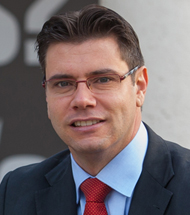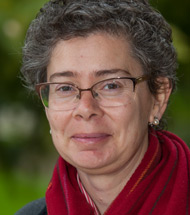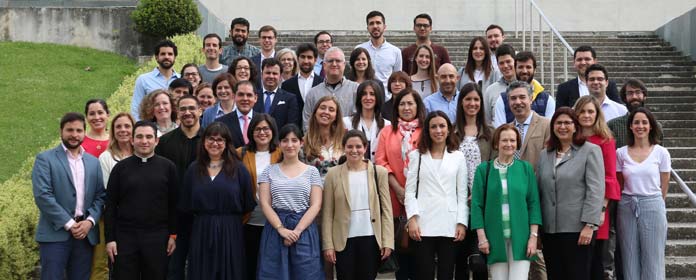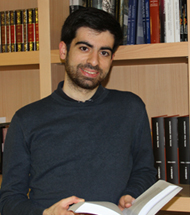"We must reconcile utopia and democracy"
The writer, critic and Spanish-Uruguayan essayist Fernando Ainsa visited ICS to deliver a lecture during a round of seminars on Latin America
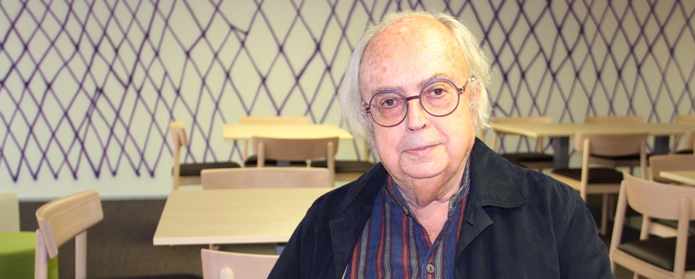
The writer, critic and essayist Fernando Ainsa was born in 1937 in Palma de Mallorca to an Aragonese father and French mother. His family moved to Uruguay after the Spanish Civil War, where he spent his childhood and youth. He worked two years in the United States as a journalist and, with the outbreak of the dictatorship in Uruguay in 1973, went to his mother’s home country, where he lied for over twenty years and worked for Unesco as the literary director of publications. He later returned to Spain and now lives between Zaragoza and Oliete (Teruel).
He is a corresponding member of the Uruguayan and Venezuelan National Academy of Letters and a member of the Royal Patronage of the National Library of Spain. He has received awards in Mexico, Argentina, Spain, France and Uruguay. His works include stories, essays, short stories, novels, criticism and the poetry the he developed in his mature years.
He recently visited the Institute for Culture and Society at the University of Navarra to give a talk on “Identity proposals and utopias in Latin America” to the doctoral students within the Institute. In this interview, his accent changes as he speaks, as a result of having lived in many countries and having married a Chilean. He sits comfortably in a chair and talks with us about his passions: literature, identity and utopias.
Is a utopia possible today?
I defend micro-utopias, autonomous, autarkic forms of organization, not a general utopia in an entire country. I have always talked about utopias and today I'm closer to the thought of the Italian philosopher Claudio Magris. In his book Utopia and Disenchantment, he speaks of the need to unite utopian thinking to certain forms of disenchantment.
Is there a negative view of utopia today? Do you think it is related to the totalitarianisms of the twentieth century?
Utopia and democracy have always been divorced because the former is totalitarian in nature. In my work “Utopizar la democracia y democratizar la utopia” (Making democracy utopian and utopianism democratic), I propose a reconciliation. Democracy needs to be made more utopian because it has deteriorated significantly. But on the other hand, utopianism needs to democratize because it is essentially totalitarian.
I think things that ostensibly begin as utopian quickly lead to authoritarian movements.
How can democracy be made more utopian?
By giving it a more hopeful content, wanting to change things, not resigning. Specifically, I have come to the ICS to present utopian proposals in Latin America. When the New World was discovered, it was seen as the place to create new utopias.
Do you think that this idyllic image has affected the development of these countries?
Today, I don’t think anyone speaks of America as a utopian continent. Stefan Zweig, a great German writer who was exiled to Brazil by Nazism in the 1940s and wrote a book called Brazil: A country of the future, was one of the last authors to do so.
Yes, there have been political movements that have defended utopianism at some point. At the beginning of the Cuban Revolution, some intellectuals claimed that Cuba was Thomas More’s Utopia, but reality soon proved them wrong. The Cuban Revolution became what it is and lost any utopian aura; today, neither Ortega’s Nicaragua nor Maduro’s Venezuela can claim they are building a utopia.
In addition to utopia, you are very passionate about identity. What do you understand for the identity of a people?
Today, identity is not what was understood in the nineteenth century when there was talk of idiosyncrasy. The core values of identity in the past – land, language, customs, etc.— have begun to disappear and today identity is much more complex. I refer to multiple identities because there is such significant mixing of cultures today to the point that identity has become increasingly blurred. A person’s chosen affinities are much more important than the characteristics of the territory, race, country or language from which he or she originates.
What do you mean by affinities?
I mean people choose who they want to associate with, especially on social networks. You can contact people from other cultures and countries. People are not limited to their neighborhoods or towns. There is so much more exchange and relationship-building than in the past when identity was predetermined by where you were born, where you lived, your family, etc...
I think it is quite unfortunate that some people today emphasize a kind of return to the nineteenth-century conception of identity, and, in doing so, sometimes even mispresent history, when the new normal is openness and exchange. It seems absurd that some want to erect borders where none exist.
If identity can be chosen by emigrating, is it better for people to cling to the customs of their home country, forget about those customs and integrate entirely, or try to mix the two cultures?
One cannot forget. I, for one, cannot forget my formative years in Uruguay, which are ever present to me. I always say that I have this “binational” condition. I have a Spanish and an Uruguayan side that share a lot and have published many books on Uruguayan culture and literature and keep in touch with friends, write, read newspapers... I have not forgotten about my adopted country and I have maintained close relationships throughout.
I think things should occur naturally. For example, when I lived in France in the 1970s, there was increased political immigration out of the dictatorships in Argentina, Chile and Uruguay. Each immigrant presented a different way of adopting. Some gathered with their countrymen to drink mate or cook typical foods and did not even try to speak French. Others simply tried to take advantage of the fact that France offered asylum and were unable to integrate. There were others who, to the contrary, did integrate and stayed despite the fact that the dictatorships in the Southern Cone fell.
What has been your personal experience?
I lived almost two years in the US, where I was able to integrate a lot because I reported and conducted interviews for Argentine and Uruguayan weekly newspapers.
When I went to France, and given that my mother was French, I also tried to improve my language skills and enrolled in a French university. To this day, I am still part of a Sorbonne research center in Paris. I do not know what would have happened if I had gone to another country, but for sure the US and France were instrumental in my education and openness.
What does it mean for you to return to your country of origin after having lived throughout the world?
I have ties to that country through friends that are still alive and through the books I publish from time to time. But returning is never easy. I would not live there again. In my youth and adolescence, Uruguay was an ideal place. It was called the Switzerland of America. Unfortunately, there is now a climate of insecurity; every time I return, I see changes that I cannot accept, especially when it comes to the deterioration of civic life.
Do you share your “binationality” with other current Latin American writers?
After the authors of the 1960s, a large diversity of issues emerged, along with a new set of authors from new generations that are largely characterized by not living in their home countries. Even those who live in the countries where they were born do not necessarily write about their realities. These writers largely publish in major Spanish publishers or are translated into French.
There are also many writers living in the US who write in English. There is now Latin American literature written directly in English. There comes a time when nationality disappears. This is what I have called “nomadic words.” A new map of belonging is emerging.
But, on the other hand, within countries there are local writers who continue to publish in national publishers and continue to have a presence. They often do not receive as much recognition as others who, because of traveling or living in another country, achieve a degree of acclaim that they would not have had in their home country. This is an unfair divorce because there are excellent works published in most Latin American countries.

